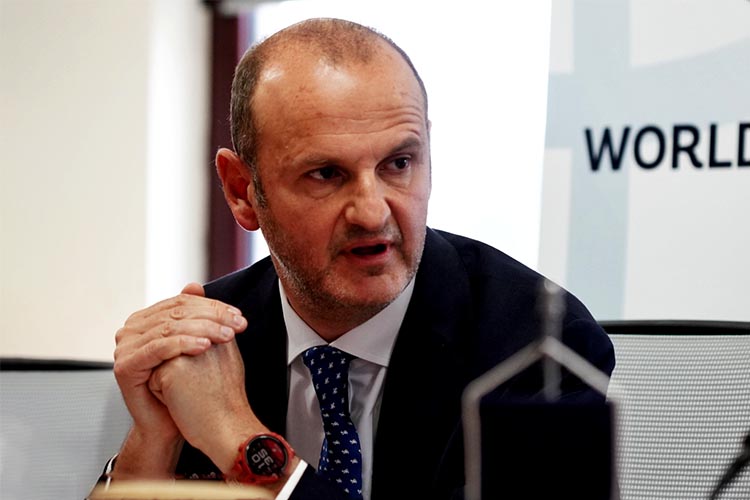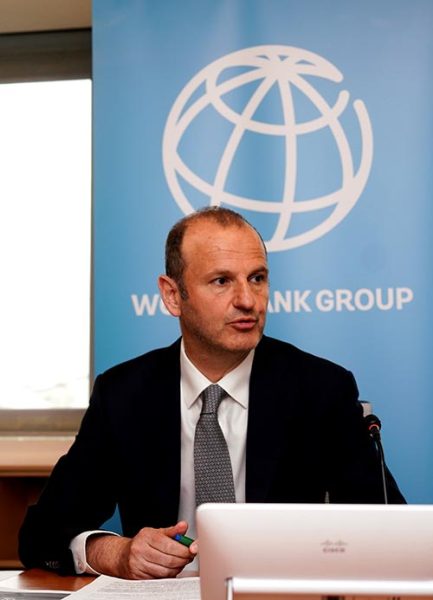Serbia’s potential for accelerated growth lies in enhancing its public institutions and governance, investing in human capital development to increase productivity, promoting regional integration and connectivity, and transitioning towards a more environmentally sustainable economy
The World Bank is involved in multiple projects in Serbia that are aimed at enhancing digital services, improving public financial management, promoting early childhood cognitive development, strengthening primary healthcare, enhancing railway sector maintenance, building local selfgovernment capacities for climate-resilient infrastructure, reducing trade costs, boosting household energy efficiency and enhancing the productivity and competitiveness of Serbian farmers. Here we discuss these and many other topics with World Bank Country Manager for Serbia, Nicola Pontara.
What, in your opinion, presents the biggest hurdle for the Serbian government in implementing systemic reforms and reorganising public enterprises?
Serbia has achieved substantial progress in selling and restructuring more than 500 state-owned enterprises over the last decade. And yet, some important sectors of the economy (energy, transport) are still managed through state-owned enterprises. Some of these enterprises can become a source of systemic risk: we saw this with Elektroprivreda Srbije (EPS) during the recent energy crisis. The remaining large, state-owned enterprises need to be put on a financially sustainable footing, with greater commercial orientation and stronger corporate governance.
Promoting innovation in Serbia, with the World Bank’s decade-long support, is vital for improving productivity, creating better jobs and driving economic growth
Some provisions of the recent law on public enterprises represent steps in the right direction. Welcome developments also include the recent transformation of EPS into a joint stock company, the appointment of supervisory and executive board members, as well as efforts that are underway to select a general manger though a competitive process.
The World Bank has 14 active projects in Serbia, covering areas such as construction, education, transportation, governance, finance, energy, agriculture, healthcare and macroeconomics. Which of them do you consider as being the most helpful when it comes to removing obstacles to growth?
Serbia can grow faster if it manages to strengthen its public institutions and governance, build human capital and foster productivity, boost regional integration and connectivity, and decarbonise the economy. Several World Bank projects seek to improve the digitalisation of services (cadastre, tax administration) and improve public financial management. In human development, we seek to build the cognitive skills of Serbian children in early childhood and to strengthen primary healthcare.

In transport, we work to strengthen maintenance in the railway sector, build the capacity of local self-governments to manage climateresilient infrastructure and reduce the costs of exporting and importing. In energy, we want to increase the uptake of energy efficiency by households. In agriculture, we strive to improve the productivity and competitiveness of Serbian farmers.
To what extent have we addressed and resolved the domestically induced energy crisis from last year, considering its significant impact on growth prospects and state financial resources?
The energy crisis may be behind us, but reforms still need to be implemented in order to stabilise the power sector in the long-term, while decarbonising the power generation mix. In March 2023, in order to help the government deal with the impact of the energy crisis and reform the energy sector, we approved $160 million in fast disbursing budget support under the First Green Transition Programmatic Development Policy Loan. Parallel financing also came in from the German KfW and French AFD. This loan aims to ‘green’ the state budget and investment framework; stabilise and modernise the power sector through the corporate restructuring of EPS, scale up renewable capacity and strengthen the energy efficiency of public and residential buildings; and to align Serbia’s regulatory frameworks on climate change with EU directives.
How would an economic growth rate below 3% this year in Serbia (according to some economists it might be below 2%) impact the country’s quest for convergence with the living standards of European Union members?
Our most recent projections indicate that economic growth for 2023 may be lower than previously expected, due to a slowdown across Europe, including among Serbia’s key trade partners, as high inflation dampens business and consumer confidence. Some of the leading indicators that we use to estimate growth – such as retail trade, construction, and agriculture – suggest that growth may hover around 2% in 2023. Serbia needs to accelerate the pace of economic growth to shorten the time required to converge with the average per capita income of the EU27.
It would be important to financially stabilise the remaining state-owned enterprises by instilling a more commercial focus and enhancing corporate governance, with some positive steps having been taken through recent legislation on public enterprises
Some areas for action include improving the quality of education, removing barriers to labour market participation (especially for women), as well as increasing standards of governance and SOE oversight.
The World Bank study “New Growth Agenda”, which was published before Covid-19 hit, highlighted productivity in Serbia as being generally low, thereby limiting the potential for wage growth. How should we address this concern effectively?
Increasing the level of productivity in Serbia will take time. Some of the required changes are not under the direct influence of the government. It is up to the private sector to change management practices, improve skills and invest in new technologies. But the government could help implement reforms to enable a better business environment: reducing red tape, streamlining the tax and customs system, and reforming the education system. Boosting private sector confidence is important, since Serbia has one of the lowest rates of domestic private investment in Eastern Europe. Serbia also needs to attract FDI to sectors with higher productivity, which can create high-quality jobs and have the potential for linkages to the local economy, such as smart mobility and advanced IT services.

According to the European Innovation Scoreboard 2023, Serbia is improving when it comes to the innovation field. How do you support this progress?
Fostering innovation is essential for Serbia to increase productivity, create quality jobs and raise the economic growth rate. The World Bank has partnered with Serbia for over a decade to support the country’s innovation capacities. Our initial collaboration, in 2011, resulted in the creation of the Innovation Fund, which today disburses around 30 million euros annually to contribute to the innovation of Serbian enterprises. Our current flagship innovation project, the Serbia Advancing Innovation and Growth Entrepreneurship, builds on these efforts, in partnership with the EU. Our next exciting prospect is to help the government move into the artificial intelligence space.
The World Bank recently approved a loan aimed at assisting the Government of Serbia in implementing its Capital Market Development Strategy by strengthening relevant capital market institutions, one of the weakest spots in the reform process. What factors led you to believe that now is the right time to initiate this process once more?
The financial sector plays an important role in channelling a country’s savings to firms so they can invest and grow. In recent years, several state-owned financial institutions were streamlined and asset quality improved, while non-performing loans fell sharply. The macro-fundamental prerequisites for the development of capital markets are in place, but diversification of long-term financing sources beyond banks still has some way to go. We are supporting the government and its Capital Markets Development Strategy through a project to develop the corporate bond market, including through green and other thematic issuances.
| DECARBONISATION The energy crisis may be over, but we still need reforms for long-term power sector stability and decarbonisation | CONFIDENCE Building private sector confidence is crucial for Serbia, because it has one of the lowest rates of domestic private investment in Eastern Europe | PRIORITY Serbia must expedite its economic growth to reduce the time required to reach the average per capita income of the EU27 |
|---|